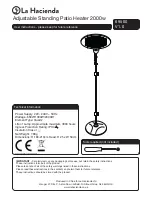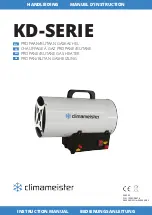
25
Insufficient gas supply may cause premature damage to the appliance.
The gas supply pressure directly affects the delivered power and can cause problems if it is not correct. If the
dimensioning of the gas piping is insufficient, the customer will not be able to enjoy the maximum benefit in terms of
performance.
When connecting the gas piping, it is recommended that a valve be set up for emergencies and to facilitate maintenance;
do not connect the valve directly to the water heater’s connector, but interpose a flexible pipe joint.
Fuel quality: the appliance is designed to work with combustible gas without impurities. If this is not the case, an
adequate filtration system should be installed upstream of the appliance, in order to restore the necessary quality.
Storage tanks (LPG): residues of inert gas (nitrogen, etc.) can become trapped inside the new tanks causing the gas
mixture to be depleted. This event can cause malfunctions or anomalies to the device. Due to the composition of the
LPG mixture, stratification phenomena of the gas components may occur during the storage period: this may cause a
change in the calorific value of the fuel delivered and consequent alteration of the appliance performance.
2.6.4 ELECTRICAL CONNECTION
Connect the appliance to a 230V ±10% / 50Hz mains.
Do not use gas or hydraulic pipes for grounding.
The electrical safety is guaranteed only when the appliance is correctly
earthed and the earthing system has been realized following all the safety
prescriptions foreseen by the law.
Make sure that the electrical system is adequate for the maximum absorbed
power and is equipped with an omni-polar disconnector with class III
overvoltage category.
The appliance is supplied with an electric cable already fitted with a plug. In case of replacement, contact a qualified
technician and use only original Rinnai spare parts to avoid invalidating the warranty.
The use of plug adapters, multiple sockets or prounges is not permitted.
The appliance meets the requirements of the European directives:
- “low voltage” directive;
- “electromagnetic compatibility” directive.
The appliances are IPx5D class (outdoor models) and IPx4D class (indoor models).
2.6.5 FLUE SYSTEM
The flue system must be carried out by competent personnel, authorized according to the law,
following the manufacturer’s instructions and respecting the provisions of the law and the
technical regulations in force.
Make sure that the flue terminal is always free from obstructions and external obstacles and that
it is protected to avoid contact burns.
The OUTDOOR model is homologated for operation without exhaust system: it is NOT allowed to
connect ANY flue system to the exhaust of this model.
The INDOOR model must be installed by ALWAYS connecting a Rinnai homologated flue system:
they cannot be operated without having correctly installed the flue system. The indoor unit’s
exhaust system is considered as part of the appliance: it is only possible to install certified and
tested exhaust systems in combination with the appliance.
The flue system type must correspond to one of the many mentioned on the data plate label
(located on the side of the appliance). Rinnai provides a specific inlet/exhaust system for the
appliance. Detailed installation instructions are supplied with the flue elements. For more
information contact Rinnai.
Coaxial flue
: in the upper part, the appliance is provided with a coaxial connection (Ø80/125mm) for the intake of
combustion air (external pipe) and for the expulsion of combustion products (central pipe). It is possible to connect
pipes to extend the flue system. The ducts (coaxial extensions and curves) must have a diameter not inferior to the
initial connection, be made of materials suitable for the appliance’s flue gas temperatures and have sealed ‘male/
female’ fittings.
Grounding
Grounding
IMPORTANT
















































